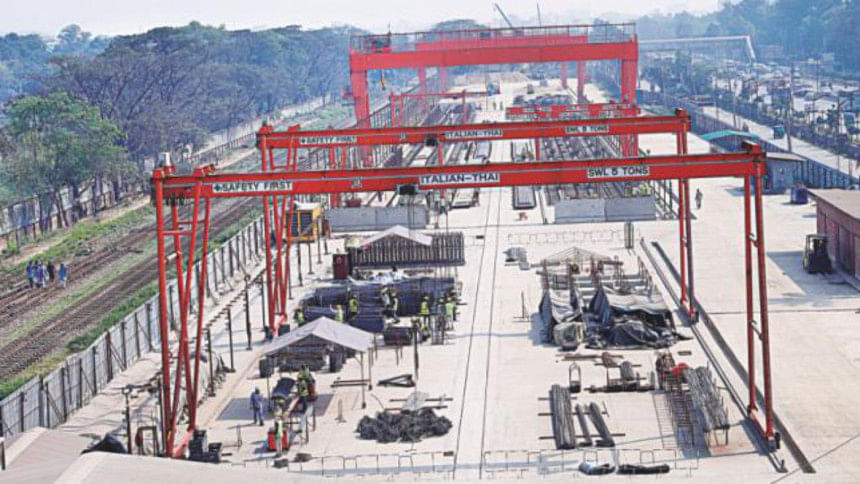Why is the project floundering?

Things are not looking very rosy for one of the largest infrastructure projects undertaken by the government under the public-private partnership (PPP) model in 2011. Yes, we are talking about the much-hyped 47-km-long Dhaka Elevated Expressway (DEE). According to a report published on the front page of this paper on February 22, work order for the project that would normally have a targeted completion time of three and a half years has not even been awarded! So, it does not really come as a surprise that project work has progressed only 7 percent in 7 years. The little progress that has been made "includes preparation of the construction yard at Kawla on Airport Road, building of some piers and other work."
As to why the work order has not been issued even after 7 years, we find that neither party has been able to live up to contractual terms. From the government side, the problem is with land. That we have an issue with land acquisition has been talked about many times. What we don't hear about, of course, is why the issues of land acquisition, compensation for landowners, and the probable relocation of affected communities are not thought out before undertaking such a major project. When we look at the construction firm, Italian-Thai Development Public Company Ltd (ITD), a Thailand-based company chosen by the government to construct DEE, we find that there is an issue with finance. The company was required to get requisite fund and submit financial statement prior to the issuance of work order. Again, we may ask, were the company's financials thoroughly scrutinised prior to the signing of the contract? Had it been done so, then perhaps we would not be in this very embarrassing situation. It is pointless trying to explain the nitty-gritty details of the contract to the general electorate who are more interested in seeing the end result, and not some pilings and pillars jutting out of the ground, and no expressway.
There are points to ponder upon vis-à-vis this mess (where there have been failings on both sides). The onus lies on the government for its failing, once again, to get requisite land for handover to the construction company on time. If we take a look at what has been done so far, the authorities have apparently handed over only 50 percent of the land of the first segment of the construction. Why is it that whenever we undertake a major project like this, it runs into the problems of relocating utility networks like sewerage or electricity? What does that tell us about the preparatory work that must precede any large infrastructure project?
ITD also has some complaints. Apparently "the layout design has been changed more than 100 times to resolve land availability issues, accommodate reservations raised by various government and private organisations." That statement basically drives a nail in the coffin of the flagship project and whether we are in any position to deliver any project within stipulated timelines. This speaks volumes about how unprofessional we are in our outlook towards projects. If the statement issued by the company is to be believed, we have sown the seeds of countless delays in time and cost-escalations because every change in design entails a cost factor and naturally, pushing back the time line.
After 7 years of lacklustre performance, we are being told by the Bangladesh Bridge Authority (BBA) that it hopes to start construction by March because there is news that the concessionaire (the constructing company) "is expected to make a deal with a Chinese financier soon." Although BBA sounds hopeful, can we share the optimism that a company which has struggled to get requisite financing for the last 7 years will clinch a financing deal and commence serious construction within three months of the work order? The reason for such scepticism arises out of the fact that ITD signed a contract with China Railway Construction Corporation in 2015 and that contract went nowhere. "It signed another deal with Chinese Investment Global Foundation Company in December 2016 and that too did not work." So, we have a series of deals and contracts signed that "did not work" and now we are being asked to believe everything will work this time around. At the end of the day, the authorities need to take a hard look at the way they handle contracts for projects like the Dhaka Elevated Expressway.
Would it be asking the impossible from the government to have a dedicated monitoring cell in the administration to look after the progress of such mega projects? As the government is also a party to the contract, changes need to be made on our side too. A review of any of these much-delayed projects will invariably show that project directorship changes many times during the lifetime of a construction work, which is hardly helpful. It is not just about cost escalation of projects like the DEE, but the wasted years of missed economic opportunity that are in question here. Why can't we go for expert advice, nationally or internationally for that matter, to negotiate the best terms for megaprojects like this? Why are there not enough contractual safeguards to take the party in breach of contract to pay fines for wasting our time? These are some of the more basic measures we can take to save ourselves from being stuck in bad contracts, which ultimately cost the nation years in project delays.
Syed Mansur Hashim is Assistant Editor, The Daily Star.





Comments